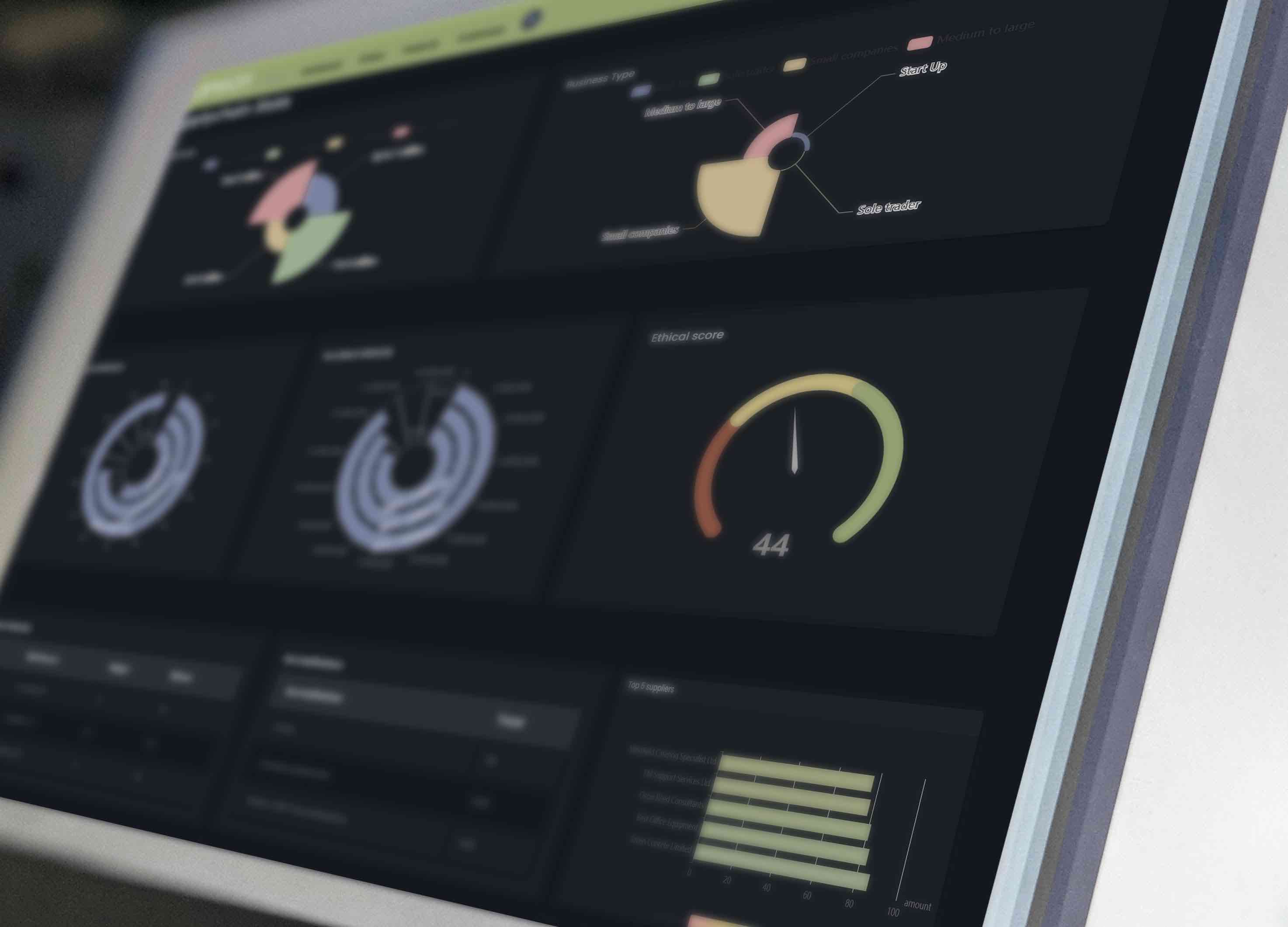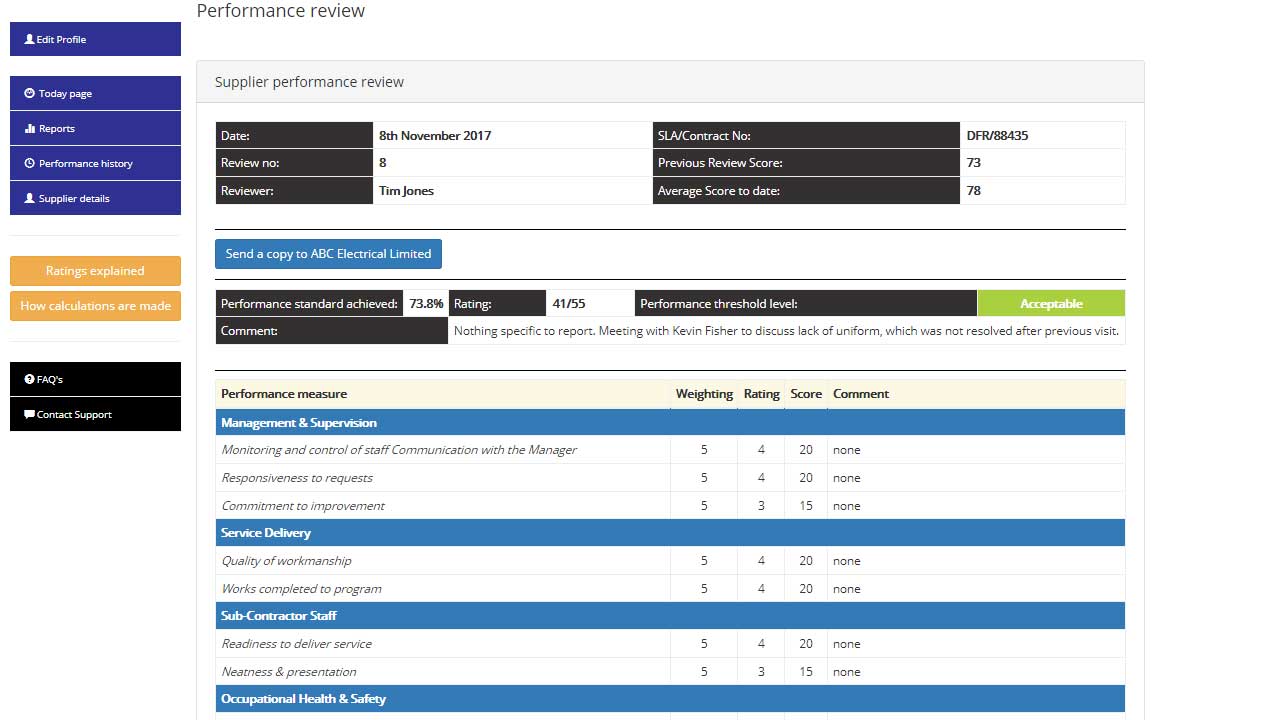Why are KPIs Important in Facilities Management?
Summary
In this article you will learn about:
- what a key performance indicator (KPI) is.
- when KPIs should be used and how many are needed.
- why KPIs should be used to measure performance.
- the importance of KPIs in facilities managament.
- how to use KIPs in Samson to measure supplier performance.

What is a KPI?
A KPI is a quantifiable measure of performance for specific objectives. KPIs provide key targets that enable you to track progress and provide insight into activities at a strategic level so that informed decisions can be made to increase performance. KPIs can also be used at an operational and functional level to provide a deeper insight into which areas require further development so that an organisation can meet its objectives. An effective KPI is SMART which follows the following characteristics...
- Specific
- Measurable
- Attainable
- Relevant
- Time-Bound
How many KPIs should I have?
It is suggested that the optimum number of KPIs that should be measured is 5 to 8. This will allow you to effectively measure a project while keeping the amount of information manageable.

When is a KPI Used?
KPIs should be used throughout an organisation from a strategic to operational level to manage risk and measure success. KPIs will provide the information required to make informed decisions to improve efficiency at each level. Other reasons to use KIPs include demonstrating compliance, internal and external reporting and complying with external information requests and regulations.
Why are KPIs important?

KPIs are important for a business to ensure activities and strategies are supporting goals. Measuring success using KPIs will both keep teams aligned, and allow for strategic choices. A KPI can indicate if a project is falling short of objectives, and can provide insight as to where adjustments to project strategy is needed.

The importance of KPIs in Facilities Management
KPIs provide facilities managers with the information required to assess how effectively their current practices function and whether they align with business goals. This allows facilities managers to identify progress and areas where improvements can be made to increase efficiency in their supply chain.
Using KPIs in Samson
The aim of KPIs in Samson is to assess a supplier’s whole performance and relationship with a supply chain end user (SCEU), and not individual performance on a project. Samson provides the ability for a SCEU to define whatever KPI criteria they wish to use and assign any of these KPIs to the working relationship between them and the supplier.
By scoring vendors over a period of time, patterns begin to emerge and the FM team can see where potential problems could lie so they can discuss with the vendor. Likewise, if every vendor scores low on a particular point it could be that the FM company has a problem to address.
Samson provides full flexibility to each SCEU to build their own KPI listing to suit their own business needs.

We know that vendor compliance is a necessary evil but Liaison saves us time, resource and more importantly money to ensure our business remains legal and makes the management of our Vendors simple.
Why are KPIs Important in Facilities Management?

What is a KPI?
A KPI is a quantifiable measure of performance for specific objectives. KPIs provide key targets that enable you to track progress and provide insight into activities at a strategic level so that informed decisions can be made to increase performance. KPIs can also be used at an operational and functional level to provide a deeper insight into which areas require further development so that an organisation can meet its objectives. An effective KPI is SMART which follows the following characteristics...
- Specific
- Measurable
- Attainable
- Relevant
- Time-Bound
How many KPIs should I have?
It is suggested that the optimum number of KPIs that should be measured is 5 to 8. This will allow you to effectively measure a project while keeping the amount of information manageable.

When is a KPI Used?
KPIs should be used throughout an organisation from a strategic to operational level to manage risk and measure success. KPIs will provide the information required to make informed decisions to improve efficiency at each level. Other reasons to use KIPs include demonstrating compliance, internal and external reporting and complying with external information requests and regulations.
Why are KPIs important?

KPIs are important for a business to ensure activities and strategies are supporting goals. Measuring success using KPIs will both keep teams aligned, and allow for strategic choices. A KPI can indicate if a project is falling short of objectives, and can provide insight as to where adjustments to project strategy is needed.

The importance of KPIs in Facilities Management
KPIs provide facilities managers with the information required to assess how effectively their current practices function and whether they align with business goals. This allows facilities managers to identify progress and areas where improvements can be made to increase efficiency in their supply chain.
Using KPIs in Samson
The aim of KPIs in Samson is to assess a supplier’s whole performance and relationship with a supply chain end user (SCEU), and not individual performance on a project. Samson provides the ability for a SCEU to define whatever KPI criteria they wish to use and assign any of these KPIs to the working relationship between them and the supplier.
By scoring vendors over a period of time, patterns begin to emerge and the FM team can see where potential problems could lie so they can discuss with the vendor. Likewise, if every vendor scores low on a particular point it could be that the FM company has a problem to address.
Samson provides full flexibility to each SCEU to build their own KPI listing to suit their own business needs.

We know that vendor compliance is a necessary evil but Liaison saves us time, resource and more importantly money to ensure our business remains legal and makes the management of our Vendors simple.



